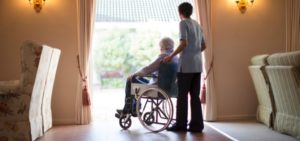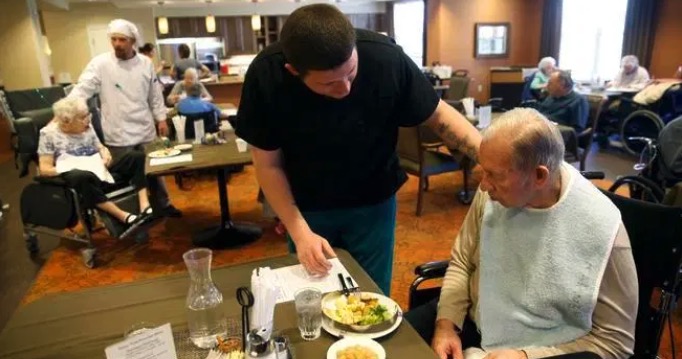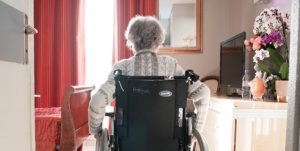
All over America, millions of senior citizens live in nursing homes or skilled nursing facilities.
For the most part, these facilities operate efficiently, and provide elderly residents with the critical care that they need.
Unfortunately…
Not all nursing homes are equipped to do their jobs properly. This is often called out by the resident’s advocates which can include family members or close friends.
ProPublica has come out with a nursing home inspect tool that provides up to date details of more than 250,000 deficiencies that occurred in nursing homes over the past few years.

This brings us to the questions:
What are the main complaints about nursing homes?
Are those complaints warranted?
Though the nursing home industry faces many challenges, Here are some of the most common problems that nursing home residents complain about.
One of the largest factors that lead to less than adequate care, has a lot to do with the staff of the facility.
Much of this is connected to the industry’s ever-changing regulations and declining profits.
(Which can make it difficult to maintain the right staff).
In an emergency…
The amount of time it takes for staff members to respond can be vital to their long-term well-being.
So, what are the problems with nursing home staff?
At the end of the day, employees are expensive, and sometimes property owners don’t have the means to pay for the staff they need. This can be due to owner negligence, or to the inability to bring resident numbers up to a capacity that is profitable for the facility.
Residents can become anxious with staff that haven’t received the right training. This can be for a variety of reasons, and is usually due to the facility lacking formal processes in hiring and training.

Nursing facilities require operational expertise to function efficiently and for whatever reason employee training is more often than not… an afterthought.
When it comes to the elderly, some of them have lost the ability to take care of themselves…
Empathy is crucial.
If the staff doesn’t care or lacks sympathy to the home’s residents, it doesn’t matter how “qualified” they are.
Quality staff involves those who meet the needs of residents in an empathetic and timely manner, to the degree that the elderly feel comfortable.
This is a common problem throughout nursing homes and is often overlooked because it doesn’t encompass meeting the residents’ “basic needs.”
In fact, strong social neglect is considered a form of nursing home abuse and should be taken very seriously. The elderly need social stimulation in order to survive, especially if they have any preexisting health conditions that make them more vulnerable.
Too many elderly patients go about their years feeling isolated from the world around them.
Not only from dwindling family visits but from the staff as well. Though when staff members are overworked or have the wrong attitude…

An elder resident could be left with nobody to interact with.
Social stimulation is important for continued brain function and an individual’s overall well-being. Therefore, this should be included with their basic needs rather than be considered an afterthought.
Harvard medical school has come out with research that suggests relationships and interaction will lengthen one’s life.
What counts as social interaction?
It’s also not just about the number of interactions, but the quality of the interactions themselves that has a profound effect on the livelihoods of the elderly.
Having relationships, as well as positive interaction is key to better health.
As adults age, their eating habits and nutritional requirements change gradually. It’s key that the elderly have a food regimen that is tailored to their health requirements to ensure their basic physical needs are being met.
A major complaint that residents have is that they’re not getting the highest quality food and diet that they need in order to enjoy a quality life.

As our nutritional requirements adjust, we need to change our diets accordingly. These nutrients help with some areas of the body that are usually first to experience issues.
These include:
(To name a few).
The nutrients they need can be found in fresh foods like fruits, vegetables, or lean meats to help meet their lower caloric intake.
Older adults generally need fewer calories and more nutrient heavy foods. A resident who is not given the right food will experience malnutrition and even dehydration.
If the conditions escalate, they can lead to severe health issues or often death, and if the nursing home is not taking responsibility for this…
It can be a sign of abuse or neglect.
So why are nursing homes not providing residents with the food they need?
A major reason has to do with cost. Healthy, fresh food can be expensive, and with dwindling profits, it can be hard for a nursing home to get the highest quality food.

A study from 2017 came out with some chilling results in which homes were spending an average of $6.08 per resident per day total.
That’s $6.08 spread across breakfast, lunch, and dinner.
Cutting food budgets, poor staff training, and insufficient time to prepare food is inevitably having a negative impact on the quality of food provided.
Just as the dietary requirements of the elderly change, so do the sleep requirements.
In general, when people reach a certain age, they need good quality sleep in order to have the energy necessary to function.
A major complaint within nursing homes and skilled nursing facilities is that residents are not able to get the quality of sleep that they need.
This can be due to a variety of reasons.
Some of which are:
Many of the above issues could affect some much-needed sleep for nursing home residents.
Some of the positive health effects of quality sleep include reduced irritability, improved memory, and can promote healing.

Facilities that do not allow residents to get the sleep they deserve could be a form of abuse.
If your family member is having trouble sleeping at their facility you should call us at (855) 344-1017 and talk to a lawyer who can help discuss your options.
Once a resident is admitted into a new facility, the staff should be doing a full assessment of the resident’s condition within 2 weeks. After this, ongoing assessments should occur at least once per year.
These assessments are important to developing a plan of comprehensive care, which should be prepared, reviewed by health care professionals, and edited accordingly.
The problem is…
Some nursing facilities will treat the process of building a custom care plan as a meaningless formality.
This results in care plans that are all identical. Even for residents that have very different health conditions and requirements.
This can lead to health problems and the wrong treatment for residents, by providing them with the wrong type of care.

The implications of a poor care plan can be very dangerous.
In fact:
Thousands of elderly people die every year due to something being overlooked when it comes to their health, and preventable deaths are something that absolutely needs to be addressed.
If a family member or loved one has died or experienced any long-term health effects as a result of either insufficient care or the wrong type of care, you may have a case for a lawsuit.
Therefore, you should get connected with a lawyer for your free consultation. There are zero fees unless you win your case.
There is a long-time stigma around nursing homes. They have been incorrectly labeled as places where people go to die or get abandoned by their families.
This is due to all of the misinformation and misconceptions that come with nursing and assisted living facilities.
This is because years and years ago…
Nursing homes were very unpleasant places.
Unfortunately, some of those unpleasant places remain, although nowadays many nursing homes are well equipped for the elderly to live quality lives.
One of the reasons facilities are labeled this way is because nursing homes are considered the last stop before a funeral home.
This is actually not the case.
Generations are now living longer than expected, and many adults require the 24/7 care of a skilled nursing facility after a health incident like a stroke or heart attack.

Once sufficiently recovered…
People often go back to their previous living arrangements.
According to agingcare.com, it is estimated that people over the age of 65 have a 43% chance of spending time in a nursing home. Of those that do, 24% of these people will spend less than a year there.
Nursing home residents for the most part, do enjoy a better life at nursing facilities rather than their own homes.
Though they may miss their old friends, families, or pets…
Residents often enjoy eating with other residents in a communal dining room, along with the activities and outings offered each day to stimulate residents both physically and mentally.
If you or a loved one are dealing with problems in a nursing home it’s important to know how to deal with conflict in the right way.
Oftentimes there are complaints with relatively straightforward solutions.
Issues like that include…
Roommate conflicts:
You should always try to resolve a roommate conflict with the person directly before complaining to staff. If not a simple room change is not out of the question, but beyond that the situation should not be escalated.
Lost Items:
Make sure that you have insurance to cover lost hearing aids, eyeglasses, dentures, or other items that are small and easily lost. If you believe something has been stolen, it’s more likely that it has been misplaced.
If your problem isn’t being resolved in the right way, or you feel like there are no proper channels to address your problem, you can always consult with a lawyer.

More serious problems like systemic issues with how the nursing home operates, could be grounds for a lawsuit.
If there is any evidence of physical, emotional, sexual, or another type of nursing home abuse present….
You should move the victim to a safe environment and get connected with a lawyer.
Give us a call at (855) 344 – 1017 for your free consultation.
The best part is that you pay nothing unless you win your case.